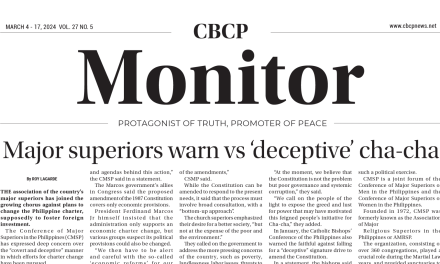
Running on anger and retaliation


“Wretched are those who are vindictive and spiteful”—Pope Francis
“For the anger of man does not accomplish the justice of God” (Rom 1:20)
These days almost anyone senses what seem to be shadows of limbo hovering over the country, if not the world. There is, first of all, the corona virus called COVID-19 that has all of us on our toes. There is the decline of investor confidence in the country, as noted most recently by a major daily. There is also the specter of promised loans for the government’s grand infrastructural program from a giant super power that are exceedingly slow in coming. But so much more of the shadows come from acted out anger that has gone from an inner emotion to stinging words to concrete acts of retaliation. Remember the anger from an alleged experience of abuse or of not being a favored candidate last presidential election that till now manifests as virulently relentless anti-Catholic Church verbal lashings at the slightest provocation? Remember the anger against persons critical of the war on drugs and the human rights record of the regime that turned into the incarceration of a senator on drug charges, the ouster of a Chief Justice on a quo warranto petition and litigation after litigation still ongoing against other political enemies? One also finds it hard to forget the anger over what may be rightly seen as “onerous” provisions of a contract with water concessionaires that became a threat to a sensational legal process aimed at terminating it.
But two other instances may have bigger and wider repercussions and, hence, are of greater national significance. First is the anger over a visa cancellation that has now resulted in the decision to abrogate the Visiting Forces Agreement earlier criticized by the Church for, among other things, its implied sacrifice of the country’s sovereignty and the inequality between the parties. The country’s senate is obviously not in total agreement and its intention to seek a Supreme Court judgment shows it. The second is another quo warranto petition by the regime’s chief lawyer aimed at scrapping the franchise of a big national media network which angered the leader of the land over perceived bias against his last presidential campaign. Since the ultimate goal may adversely affect thousands of jobs and millions of television patrons but especially press freedom, the resulting uproar is further darkening the shadows over the national horizon.
Anger and retaliation have characterized human behavior since time immemorial, particularly when humans deal with perceived enemies. They especially appear to be becoming vintage to the regime. However it may hope to achieve its purposes in stopping perceived enemies in their tracks, promoting good will not be one of them. Any human endeavor that seeks collective goals cannot truly succeed if it runs low on good will. This alone will impede its real aim at achieving the common good which is the real end of governance. There is no common good known to the human race that is built on common ill-will.
But that is the trouble when humans only listen to their own voice and refuse to listen to fellow humans or to a higher voice. There is, for instance, an important voice that says: “Anger is a desire for revenge. To desire vengeance in order to do evil to someone who should be punished is illicit but it is praiseworthy to impose restitution to correct vices and maintain justice. If anger reaches the point of a deliberate desire to kill or seriously wound a neighbor, it is gravely against charity; it is a mortal sin…” (Catechism of the Catholic Church, no.2302).
It is interesting how Pope Francis recently dealt with anger, no matter how unexpected or unintended. In a video that went viral the pope appears to be clearly piqued when an Asian lady grabs his hand toward her as he walks through a crowd of the faithful. Many in the media describe him as slapping the woman’s hand as he struggles to free himself from her determined grasp. People focused on the action as unbecoming of a Churchman and a Roman Pontiff at that. They mostly soft-pedalled on the pope’s later vigorous apology and how he invited and received the same lady into what appeared a special audience. Clearly the Holy Father responded to his own sudden irritation with an act of humility, charity and reconciliation.
Even more remarkable, more prior and more significant is the Gospel writer Luke’s account of how the apostles James and John, angered by the rejection they suffered in Samaria, are portrayed as wanting retaliation, like many of us. They ask Jesus: “Lord, do you want us to call down fire from heaven to consume them?” Luke notes that Jesus “turns to them, rebukes them and says: ‘Do you not know of whose spirit you are? The Son of Man came, not to destroy lives, but to save them.’ And they went to another town” (Lk 9:54-56).
Therein lies the rub. We ought not to forget to ask whose spirit we are? We are of the Spirit of Christ Jesus who came not to destroy or kill but to save. Instead of running on anger and retaliation, we should rather work on forgiving, seeking forgiveness, restitution and reconciliation.
Then we can move on to “another town” of a glorious history we should rather be making.









